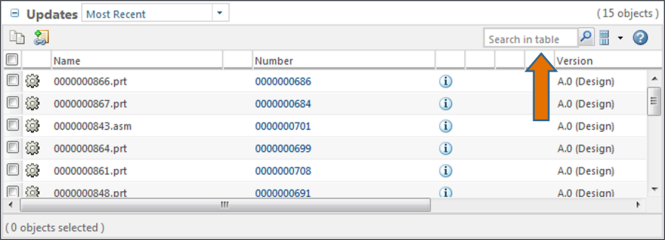Searching Within Tables
The Search in table field appears on most tables throughout Windchill:

This search field does not perform a typical Windchill search. Instead, it filters the table rows using the information that is visible in the table columns.
The following rules apply when searching within tables:
• You are only filtering the data that is currently visible in the table. If you hide a table column, the table search is not applied to the values contained in the hidden column.
• The question mark character (?) is processed as a literal character instead of a wildcard.
• If you include spaces within your search terms, the spaces are considered literally.
• The order of the strings within a value is considered. For example, searching for part design does not return an object with the value “design part.”
• You can use an asterisk wildcard (*) to substitute for characters within a string and for spaces between strings. For example, a search for 123*78 would return results for “12345678” and “1234 5 678.”
• The asterisk wildcard (*) used at the beginning or ending of a single search string is unnecessary and does not change the filtering behavior.
• If you include multiple strings separated by spaces, then the placement of the asterisk wildcard (*) is considered. For more information, see the examples below.
For simplicity, the following examples use only the object name. However, table searches filter all visible column data. For example, if the table includes a State column and you search for w, then all objects that are in the In Work state are returned. |
For example, consider a table with the following objects:
Engine.asm |
Spotlight 023 |
material weight specs |
Design Guide |
Part 890 |
You perform the following table searches. Highlighted rows indicate the objects that would appear in your search results:
• Search in table: g (or g* or *g)
Engine.asm |
Spotlight 023 |
material weight specs |
Design Guide |
Part 890 |
All objects with the letter ‘g’ in their names are returned, regardless of whether the ‘g’ appears at the beginning, middle, or end of a string.
• Search in table: ig (or ig* or *ig)
Engine.asm |
Spotlight 023 |
material weight specs |
Design Guide |
Part 890 |
Even though “Engine.asm” has both a ‘g’ and an ‘i,’ the characters you enter in the search field are not processed on an individual basis unless you include a space between them.
• Search in table: i g (or i g* or *i g)
Engine.asm |
Spotlight 023 |
material weight specs |
Design Guide |
Part 890 |
No objects are returned. The search includes a space between ‘g’ and ‘i,’ and therefore Windchill considers each a standalone string:
◦ i g—Windchill filters for two one-character strings (for example, “Part I G 890”).
◦ i g*—Windchill filters for a one-character string (‘i’) followed by another string that begins with ‘g’ (for example, “Part I G890”).
◦ *i g—Windchill filters for a string that ends with an ‘i’ followed by another string with one character (for example,“Part 890I G”).
• Search in table: ight (or ight* or *ight)
Engine.asm |
Spotlight 023 |
material weight specs |
Design Guide |
Part 890 |
• Search in table: light (or light* or *light)
Engine.asm |
Spotlight 023 |
material weight specs |
Design Guide |
Part 890 |
• Search in table: lght (or lght* or *lght)
Engine.asm |
Spotlight 023 |
material weight specs |
Design Guide |
Part 890 |
• Search in table: l*ght
Engine.asm |
Spotlight 023 |
material weight specs |
Design Guide |
Part 890 |
When used in the middle of a search string, the asterisk wildcard character (*) can substitute for one or more characters, including spaces between strings.